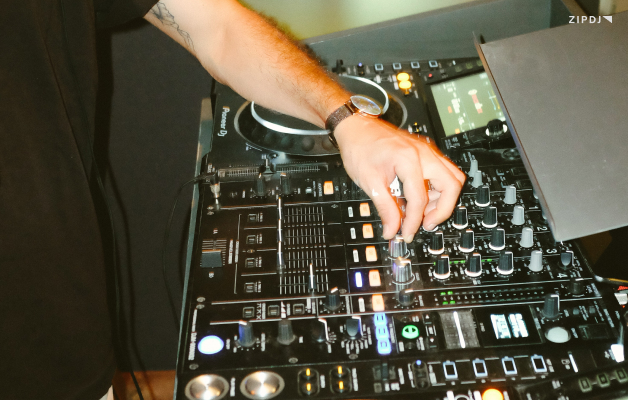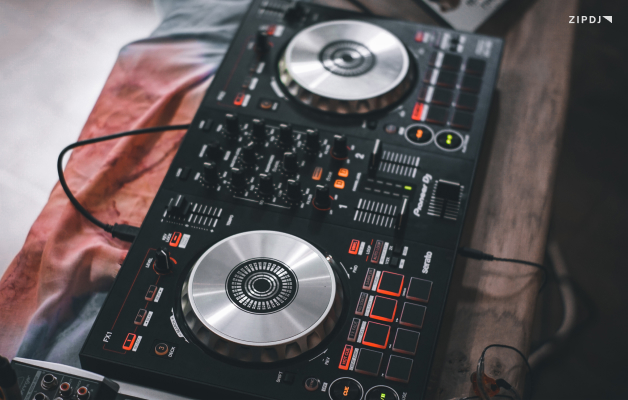The Complete Guide To The History of DJ Pools

DJs have sourced the latest releases from many places over the decades, and record pools are the most recent innovation to help.
From the early use of pools for physical vinyl releases in the 1970s to the modern digital DJ pool, they’ve remained at the cutting edge of music.
Find out everything you need to know about how these exhaustive resources for the latest tracks have evolved in this complete history of DJ record pools.
What Is A DJ Pool?
A DJ pool is a direct music service professional DJs use to acquire new music to use in their sets in venues and on radio shows.
When using a record pool, working DJs typically pay a monthly subscription fee, which gives them complete access to the pool’s library.
Record pools also work closely with record companies and other figures in the music industry to acquire exclusive content.
This allows them to create archives of music unavailable elsewhere and release music before it becomes available on mainstream outlets.
Radio DJs and other professional DJs can play all the music they download from a record pool without violating copyright laws.
Understanding what a DJ pool is will also help you refine your track selection and ensure your playlists have lots of fresh material.
Who Can Access A DJ Pool?
The verification process used when signing up for a record pool varies from service to service, and some can be tricky to get onto.
In some cases, record pools will require proof that you’re working as a professional DJ in venues or on the radio.
This is because of their exclusive content and to prevent non-DJs from using it as an alternative to Tidal, Spotify, and other streaming services.
It may also be conditional on their relationship with record labels and the terms and conditions relating to the music’s exclusivity.
With that said, not all DJ pools will require you to go through the process of verifying your professional status as a DJ.
Some DJ pools are created for all types of DJs to sign up and access their archives, whether gigging DJs or bedroom hobbyists.
Benefits Of Using A DJ Pool
The ability to access new and exclusive releases before they hit consumers is one of the main draws for DJs who use record pools.
As we’ve touched on above, they also get peace of mind that they won’t get in trouble for playing unauthorized tracks in their DJ sets.
Record pools are updated regularly, so DJs can be sure to have ongoing access to licensed tracks to use in their professional capacity.
They also offer carefully curated libraries across many genres, from hip-hop and electronic music genres to Latin music and other niche interests.
It’s also important to understand the importance of record pools for DJ promotion and how they can be used to forge professional relationships.
This allows record pool users to engage with artists and record labels and get a deeper insight into the requirements of a disc jockey.
The History of DJ Pools
We’ve covered what you can expect today when signing up for a DJ pool and the advantages they offer for working DJs.
Now, let’s place this service in the context of the past and how early access to vinyl record pools and other services helped DJs.
So, without further ado, here’s our complete guide to the history of DJ record pools:
DJ Pools In The 1970s
The art of DJing kicked into gear with the launch of the early direct drive turntables from Technics that allowed for mixing two tracks.
By the early 1970s, many professional DJs were spinning vinyl and looking for the latest music for their sets.
This led to the emergence of music promoters, supplying promotional freebies to help emerging artists gain exposure through playtime.
Indeed, the history of record players is deeply intertwined with how DJs gained access to new releases from record labels.
In 1975, David Mancuso launched the New York Record Pool, using his own funds to finance the organization for its first two years.
Beginning as a non-profit organization, the music pool fostered a grassroots pipeline between artists, record labels, and DJs.
Giving them early access to the greatest debut albums of the 70s and underground classics, record pools would redefine the DJing workflow.
White Label Vinyl Releases
By the 1990s, electronic music DJs had risen significantly in number, playing new music from genres including house, techno, drum and bass, and hip-hop.
During this era, the proliferation of music producers catering to these genres created fertile ground for bedroom DJs and producers.
Many unsigned producers would finance small pressings of their tracks using plain white labels and sharing these with DJ friends.
At the same time, independent record labels used the white label test pressing format to try out new material anonymously.
This made the white-label concept a crucial source of exclusive and rare releases for DJs dedicated to cutting-edge mixes in underground clubs.
It’s a method that has been regularly used by the best techno DJs worldwide, trying exclusive cuts and new tracks from local artists.
White label releases also paved the way for now-established outlets such as Warp Records and other labels with international reach.
MP3s & File Sharing Platforms
When exploring the music industry’s evolution, it’s impossible to overlook the importance of the MP3 music format and file-sharing platforms.
Such file-sharing platforms began life as the hugely popular Napster file-sharing service, which made its internet debut in the late 1990s.
Napster became notorious for hosting content in violation of copyright laws while also transforming how DJs accessed music.
In addition to leaked music from established artists, Napster also offered a platform for new producers to get their tracks heard.
Indeed, many smaller artists at the time praised Napster for giving them a much-needed outlet to reach DJs and other tastemakers.
Search and filter tools that are commonplace today were also introduced with Napster and other file-sharing platforms of the era.
While these platforms inevitably failed due to their illegal foundations, many of the features included are now integrated into record pools.
General Music Streaming Services
There are several ways streaming is impacting DJs, both positively and negatively, that have shaped how they perform over the years.
Like record pools, streaming services offer a large selection of archived and new music, with a monthly subscription required for access.
But while streaming services are great for researching music to play in DJ sets, the tracks aren’t available to download and play professionally.
Platforms such as Spotify, Tidal, and Apple Music only allow the music on their platforms to be streamed by consumers, not licensed venues.
Streaming Services For DJs
On the other hand, certain streaming services are tailor-made for DJs and designed to be used to upload DJ sets.
Websites like MixCloud are great for promoting your mixes and reaching out to booking agents, venue owners, and online fans.
Each of these types of streaming services has further refined the categories and tags used by their file-sharing predecessors.
They also employ effective artificial intelligence algorithms to help users refine their search options and discover new content.
Spotify’s Release Radar and Discover Weekly playlists offered a clear model for how AI can be used to drive the best new material.
The more users engage with the platform through play time and the Likes feature, the more powerful these algorithms become.
These advancements then helped to shape the next step in the evolution of music sharing and the birth of the digital record pool.
Birth Of The Digital DJ Pool
From their origins as niche services for professional DJs, the record pool has long served as an intermediary between labels and DJs.
By the mid-2000s, record pools had gone fully digital, serving over 7000 DJs and industry professionals looking for new music.
Focusing on the best music genres for DJs, record pools combined the search and filter functions of streaming services with extensive music libraries.
The transition to digital formats also allowed these record pools to instantly supply DJs worldwide with cutting-edge tracks.
This included expanding the type of tracks featured on the service to better assist with the requirements of different types of DJs.
For example, record pools expanded their listings to include edits with offensive language removed that radio DJs were able to air.
Remixes were also complemented by a variety of other edits and mashups, as well as instrumental and acapella versions.
This made the arrival of digital record pools a revolutionary way for DJs to hunt down the best exclusive cuts for their DJ mixes.
DJ Pools Vs Remix Services
Around the same time digital music pools increased in popularity, remix services also appeared on the music scene.
It’s important to separate the two from each other since the best DJ pools are also commonly known for their commitment to remixes.
While record pools and remix professionals offer a service, the art of remixing is an altogether different process with its own challenges.
As such, remix companies require in-house studios for music production and experienced producers to create their content.
They also use expensive mastering equipment to ensure their remixes are professionally produced and ready for distribution.
Remix services have the full rights when working on new versions of successful songs, which gives them additional potential overheads.
This sets them apart from other casual remixers and bootleg versions that aren’t produced with the authorization of the copyright holder.
While a DJ record pool isn’t responsible for remix production, they are among the biggest clients when it comes to exclusive distribution.
Indeed, the best remix services for some of the major labels are partnered exclusively with record pools to deliver unique content.
DJ Pool Core Features
As the future of music continues to evolve with new emerging technology such as artificial intelligence, record pools have also innovated.
Today’s leading record pools have embraced these innovations and fine-tuned their services to deliver the best possible results.
Extensive tagging systems have been introduced that allow working DJs to create a wide range of playlists for their DJ sets.
This includes tagging tracks by mood and vibe to quickly access them at the drop of a hat, whether DJing at a wedding or nightclub.
The search and filter functions that were first used on file-sharing platforms have also progressed to make digital crate digging simple.
DJ Pool Innovations
Additional features commonly available in record pools include genre categorization and information on the beats per minute and key of tracks.
Recommended cue points, ID3 data, and beat grid detection are also innovations that record pools have marshaled to assist users.
Feedback and star rating systems have been added to enhance the feedback loop between DJs and the music label’s producers.
Likewise, carefully curated playlists from the DJ record pool owners save valuable time when compiling new playlists for sets.
Digital DJ record pools have also evolved in line with the rise of smartphone use, with mobile app versions to browse on the move.
Combined with extensive back catalog capabilities and guaranteed availability, the record pool has become the go-to resource for many DJs.
Summary
So, that’s a wrap on this dive into the history of the DJ record pool and how it has helped to shape the musical landscape over the decades.
DJ record pools have evolved to meet the demands of professional DJs, delivering exclusive access to new releases, edits, and remixes.
If you’re a gigging DJ looking to expand your library or a newcomer starting their collection, a record pool service provides an essential resource.
Explore extensive archives and download new releases with a ZIPDJ subscription, and experience what the best DJ pool has to offer.
Not a member ?
Join Today for Unlimited Music Downloads. Visit zipdj.com for more information.



